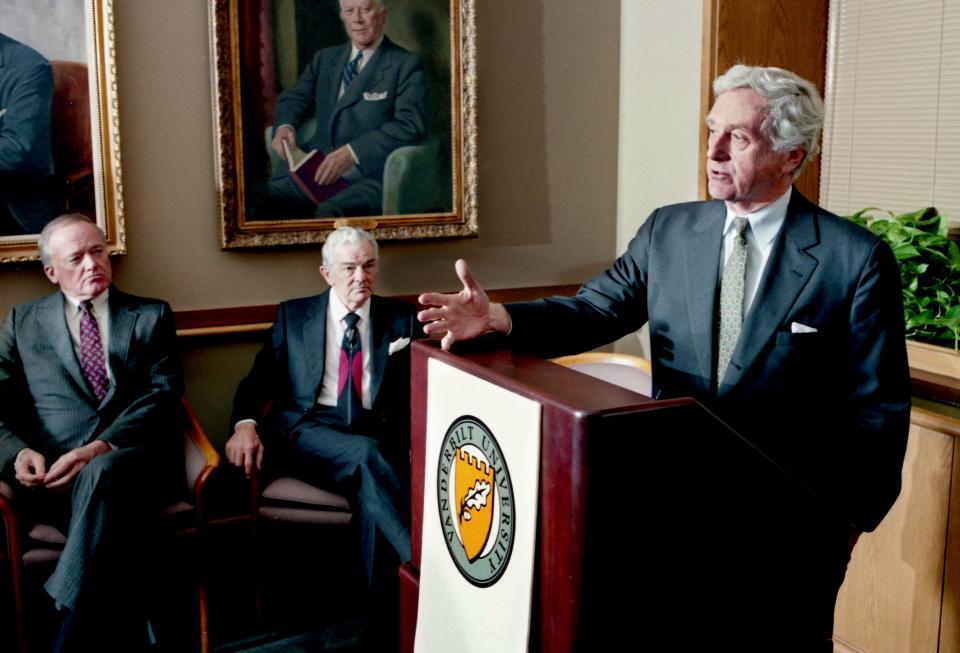First Amendment rights provide Americans broad leeway, but there are also limitations
Editor's note: This is a regular feature on issues related to the Constitution and civics education written by Paul G. Summers, retired judge and state attorney general.
The U.S. Constitution is the supreme law of America. Amendments are part of the Constitution. The first ten Amendments, or Bill of Rights, were submitted to the state legislatures in 1789 and ratified in 1791.
Our Constitution provides for three separate branches of government: legislative, executive and judicial. The first two are political; the judiciary is not.
Judges must be independent; follow the rule of law; and act as checks and balances on abuse of power by any branch. The Supreme Court ultimately decides whether a law or activity of any of the three branches of government comports with the Constitution.
The independence of the third branch is the crown jewel of our democratic republic. Amendment I says:
“Congress shall make no law respecting an establishment of religion, or prohibiting the free exercise thereof; or abridging the freedom of speech, or of the press, or the right of the people peaceably to assemble, and to petition the Government for a redress of grievances.”
We Americans must always strive to keep that crown jewel of our democratic republic.
More civics education: U.S. Constitution offers this nation structure, direction and strong institutions
There are limits to the First Amendment
The First Amendment prohibits any governmental interference regarding freedoms of religion; speech; the press; peaceful assembly; and ability to petition our government. It prohibits any laws that create a national religion or hinders the free exercise of religion, abridge freedom of speech or of the press (media publication). This Amendment prohibits any law that interferes with people who peaceably assemble or petition our government over issues or grievances.

The First Amendment has been interpreted by the Supreme Court as applicable to the federal government and the states, including political subdivisions, pursuant to the Due Process provision of the Fourteenth Amendment.
The First Amendment has limits - particularly if another person’s rights might be violated. Although the amendment “separates church from the state,” there are limits. For example, someone could not injure or harm another even if they claimed such injury was “part of my religion.”
Likewise, bus transportation for religious schools generally does not violate the Establishment Clause of the First Amendment.
Most speech is constitutional, even if it hurts somebody’s feelings; or they disagree. But all speech is not permitted. For example, laws prohibiting actual threats to public officials are forbidden, as in a threat to a federal judge. Likewise, some pornographic laws are constitutional. Some are not.
Finally, it is obvious that one can peaceably assemble or petition the government, but one cannot do it violently. One must use common sense and discretion.
Here’s how the politicians and the judges differ
We live in a free society and make independent decisions, so long as they do not violate the inherent freedoms of others. In case of doubt or argument, our Supreme Court makes the final decision. Congress and the President decide on policies and the laws, and the Court decides on constitutionality.
Our Founding Fathers were not only smart, but clairvoyant.
We continue with the Second Amendment in the next article.Reading and studying the Constitution and Declaration of Independence are times well spent.
We applaud the hard work and diligence of our dedicated readers. Both this publication and the author strive to be nonpartisan and objective. Please understand that the interpretations involving documents are that of the author. Others may have different interpretations. We always welcome comments.
Paul G. Summers, a lawyer, is a former appellate and senior judge, district attorney general, and the attorney general of Tennessee. Raised in Fayette County, Judge Summers resides in Nashville and Holladay.
This article originally appeared on Nashville Tennessean: Civics lesson: First Amendment rights are broad, but there are limits
